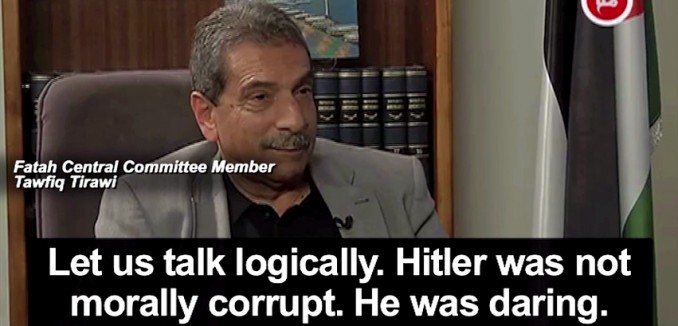A senior official from Fatah, the ruling party of the Palestinian Authority, declared in a TV interview Tuesday that “Hitler was not morally corrupt, he was daring.”
Tawfiq Tirawi, a top member of the Fatah Central Committee and former head of Palestinian intelligence, said in remarks broadcast on the Palestinian TV network Ma’an that “there is a difference between an officer’s discipline and loyalty to a leader. The leader could be morally corrupt.”
After his host asked how Tirawi would know this, the Fatah official inquired, “You have to know. Is there anyone who does not know his leader?”
“The German people did not know that Hitler was morally corrupt,” the host countered.
Tirawi quickly interjected and said that Adolf Hitler “was not morally corrupt.” He soon added, “let us talk logically. Hitler was not morally corrupt. He was daring.”
After this reply, the host cut to a commercial break in an attempt to veer the course of the discussion.
A video of the exchange is embedded below, translated by the watchdog organization Palestinian Media Watch.
During the same interview, which was also translated by the Middle East Media Research Institute, Tirawi said that “a Palestinian state in the 1967 borders, with Jerusalem as its capital, is just a phase, as far as I’m concerned.”
“Don’t think that there can be a solution to the Palestinian issue by establishing a state the borders of which are limited to the West Bank and Gaza,” he added. “I challenge any Palestinian to say that the map of Palestine is limited to the West Bank and Gaza.”
He explained that this doesn’t mean he wants to “throw the Jews into the sea,” or “give them plane tickets out of here,” as his interviewer suggested, but to live with them as minorities in a single Palestinian state.
Tirawi is not the first Palestinian leader to appear to defend Hitler, whose ties to the Mufti of Jerusalem Haj Amin al-Husseini—a father of Palestinian nationalism—generated some controversy last year.
Edy Cohen explored the complex relationship between the Third Reich and al-Husseini, and its lasting effects on modern Palestinian nationalism, in The Tower Magazine this November.
[Al-Husseini] was not only the founding father of the Arab national movement in Palestine. He was also a fervent anti-Semite, the most important Nazi collaborator in the Arab world, and a political activist who worked tirelessly for the ethnic cleansing and physical destruction of the Jews in Palestine and in the Middle East as a whole. …
Though he was not an architect of the Holocaust, he knew about it, collaborated with it, and did everything he could to ensure that the Nazi extermination machine would ensnare as many Jews as possible. Even worse, perhaps, he worked toward a second Holocaust in the Middle East, one that, together with the European Holocaust, might well have resulted in the near-complete annihilation of the Jewish people.
Almost as important is the Mufti’s influence over the Arab national movement in Palestine that he founded. Today, Palestinian leaders still revere the Mufti and embrace his policy of absolute rejectionism. His tactics of incitement are employed by supposedly moderate groups like Fatah and leaders like Mahmoud Abbas, whose recent claims regarding the Temple Mount were identical to those made by the Mufti. And the Mufti’s openly genocidal stance toward the Jews and his emphasis on radical Islamic ideology finds expression in the actions and beliefs of Hamas. It is only when the Palestinians finally reject the Mufti and his poisonous legacy that peace will, at last, become possible.
[Photo: palwatch / YouTube]




